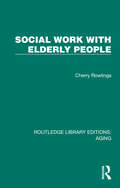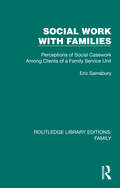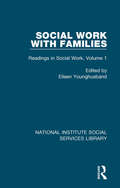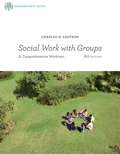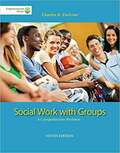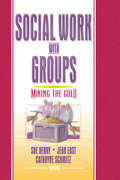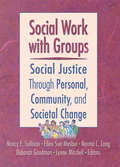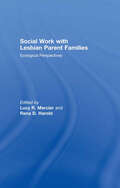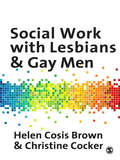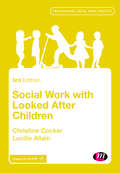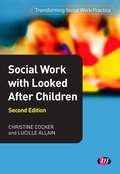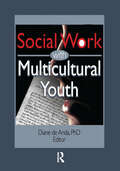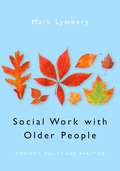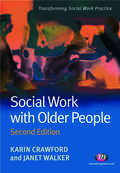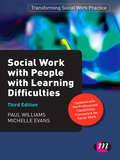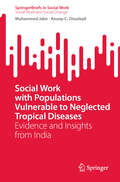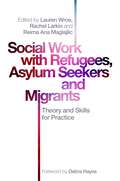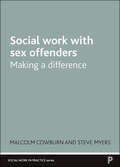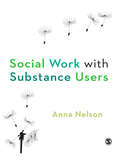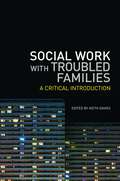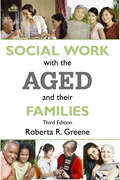- Table View
- List View
Social Work with Elderly People (Routledge Library Editions: Aging)
by Cherry RowlingsThe care of elderly people, particularly those who are frail, is a major task facing society. Originally published in 1981, this book considers the challenge of caring from a social work perspective. It locates social work with elderly people firmly within the mainstream of social work ethics, knowledge and skills, and demonstrates how work with the elderly both informs and in turn is informed by an understanding of work with other client groups.
Social Work with Families: Perceptions of Social Casework Among Clients of a Family Service Unit (Routledge Library Editions: Family)
by Eric SainsburyOriginally published in 1975 and based on a study of the memories and perceptions of twenty-seven families known to a Family Service Unit, and of their most recent social workers, this book was an important contribution to our knowledge of consumer opinions of the social services at the time. In particular, it draws attention to factors relevant to the evaluation of social work practice and to the definition of success. The family members describe for themselves, by means of extracts from tape-recorded interviews, what it feels like to have problems, to be referred for help – in short, to be a ‘client’. They give an account of the help they have received and define the personal attributes and activities which they have found helpful and appropriate in social workers. This book would have been of special value to social workers, to social work students, and to all those concerned with social policy and administration. Today it can be read in its historical context.
Social Work with Families: Readings in Social Work, Volume 1 (National Institute Social Services Library)
by Eileen YounghusbandOriginally published in 1965, this book gathers together some outstanding contributions to various aspects of social work with families. The subject was now more than ever of concern to social workers, as fresh knowledge added to their understanding of the dynamics of family life and interaction. The papers which compose the book were written by well-known authors from both sides of the Atlantic. They are arranged in three sections dealing with: normal and less normal families as a group; with particular crisis situations for children; and with some more theoretical concepts contributing to an understanding of family types. This volume was the first in a series of Readings in Social Work designed to collect together significant articles on different aspects of social work.
Social Work with Groups: A Comprehensive Worktext (8th edition)
by Charles H. ZastrowUsing a plentiful selection of skill-building and self-evaluation exercises, author Charles Zastrow's comprehensive, workbook-style text promotes his philosophy that you can learn group leadership skills best by practicing them in class. In this eighth edition of SOCIAL WORK WITH GROUPS: A COMPREHENSIVE WORKBOOK, Zastrow discusses topics central to a successful understanding of group leadership: stages of groups, group dynamics, verbal and nonverbal communication, types of groups, and diversity in groups. When you participate in groups, the classroom becomes a "lab" where you can experience what it's like to work in and lead the many kinds of groups the author discusses.
Social Work with Groups: A Comprehensive Worktext (Brooks/Cole Empowerment Series)
by Charles ZastrowUsing a plentiful selection of skill-building and self-evaluation exercises, author Charles Zastrow's comprehensive, workbook-style resource promotes his philosophy that you can learn group leadership skills best by practicing them in class. <p><p> In this ninth edition of SOCIAL WORK WITH GROUPS: A COMPREHENSIVE WORKBOOK, Zastrow discusses topics that are central to a successful understanding of group leadership: stages of groups, group dynamics, verbal and nonverbal communication, types of groups, and diversity in groups. With support from this book, your classroom will become a "lab" where you can experience what it's like to work in and lead many kinds of groups. <p><p> Updated throughout with timely new topics and firsthand accounts from experienced social group work professionals, this edition also includes a new chapter on treatment groups with diverse and vulnerable populations. Attention CourseMate user: Cengage support for existing users of CourseMate will end of 8/1/2020.
Social Work with Groups: Mining the Gold
by Sue Henry Jean East Cathryne SchmitzHone your group work skills to make sessions even more meaningful!Social Work with Groups: Mining the Gold examines a wide array of varieties of social group work practice, from corrections through empowerment and international issues. It explores ways to deal with youth violence (following the shootings at Columbine High School), issues of social exclusion, empowerment practice, groups in correctional settings, group work practice with seniors, gender diversity, multicultural groups, teleconferencing groups, and education for social work group practice. Every chapter author who contributed to this timely and important volume reflects the “gold” to be mined in the use of groups in social work. Linda Hutton shares her first-hand experience of working with chronically paranoid schizophrenic clients who are also chemically addicted. Marshall Rubin and Carol J. Hinote explore ways of working creatively with different populations--Rubin confronts the use of structured program designs and Hinote describes the challenge of being a woman worker with a group of mentally ill men. Paul Abels and Sonia Leib Abels examine the use of narratives in social work with groups. Beverly Ryan and Patty Crawford discuss the creation of support groups for elderly people dealing with loss, and Jean East, Susan Manning, and Ruth J. Parsons explore ways for group work to advance the social work empowerment agenda.Social Work with Groups also explores case studies of: a school-based project to prevent violence a European group work plan to fight social exclusion in a multicultural environment a prison-based group work program ways to use gender diversity to enrich the group experienceSocial Work with Groups brings you insightful commentary from the people who are developing cutting-edge programs and expanding the boundaries of group work. No social worker who wants to function most effectively in a group setting should be without it!
Social Work with Groups: Social Justice Through Personal, Community, and Societal Change
by N. Sullivan L. Mitchell D. Goodman N.C. Lang E.S. MesburHelp change the world by bringing ideas of social justice into your group work practice! Social workers who use hip-hop music to reach out to troubled adolescents. Practitioners who compare First Nations talking circles with social work practice with groups. A retired professor who transforms the way her fellow senior living center residents participate in their world. Fathers of children with spina bifida who help one another through an online discussion group. These and other examples you’ll discover in Social Work with Groups: Social Justice Through Personal, Community, and Societal Change will help you to assist groups to gain a sense of empowerment and create change in their own lives and communities. In Social Work with Groups: Social Justice Through Personal, Community, and Societal Change you’ll also find: definitions of social justice within the context of social work a proposal to help focus on social justice in teaching guidelines for group facilitators making decisions about self-disclosure studies of innovative group work discussion of the challenges to achieving social justice in group work valuable ways to ground social group work in rich cultural traditions This new book rides the crest of the growing wave of justice in social work with groups. Culled from the proceedings of the 22nd International Symposium of the Association for the Advancement of Social Work with Groups, it gives you the innovations and current thinking of professionals who, while coming from different cultural and professional backgrounds, are focused on helping all people enjoy the same rights and opportunities. If you want to use group work to challenge social inequality, Social Work with Groups will be a welcome addition to your library. Social action that gets results has to start somewhere—let it begin with you!
Social Work with Lesbian Parent Families: Ecological Perspectives
by Rena D. Harold Lucy R. MercierThe traditional concept of family as being exclusively heterosexual has resulted in myth-generation about lesbian parents as well as fostering limitations in the programs and benefits that support more diverse nontraditional families. Social Work with Lesbian Parent Families: Ecological Perspectives explores the variety of social systems with which lesbian parent families interact, with a focus on implications for improved, diversity-affirming service delivery and policy development. Unlike other literature on lesbian parent families, this revealing resource pulls together work on lesbian parenting from various researchers across a broad range of disciplines and presents this work from the ecosystems perspective so that the reader may view the experiences of lesbian parent families in a holistic way. The research goes beyond simple comparisons between lesbian and straight mothers. This useful text provides more complex research data, including both a more sophisticated view of the diverse communities in which lesbian parents are found, and more innovative ways of studying the issues relevant to social service providers. Developmental and life issues negotiated by lesbian parent families are discussed in detail using a strengths-based approach to intervention with individuals, families, small groups, communities, and larger systems. This unique book has the strong potential to influence the policies that impact lesbian parent families.Social Work with Lesbian Parent Families: Ecological Perspectives is a valuable resource for social workers, psychologists, sociologists, anthropologists, marriage and family therapists, public policy and administration professionals, students, and academics doing research on sexual orientation and family.This book was published as a special issue of the Journal of Gay & Lesbian Social Services.
Social Work with Lesbians and Gay Men: Working With Lesbians And Gay Men (Basw Practical Social Work Ser.)
by Christine Cocker Helen Cosis BrownWorking with lesbians and gay men is a largely neglected area of social work practice. This book provides social workers and other professionals with an overview of a number of key challenges and concerns that play a significant part in the lives of lesbians and gay men. Despite positive changes in legislation, social work can still fail to meet the needs of lesbians and gay men, and remains a marginalised area in practice, research and teaching. This book promotes an understanding of these issues and proposes ideas for social work practice that are inclusive of lesbians and gay men in assessment and the provision of services. The book clearly links knowledge and practice and is structured in such a way so that theories relevant to social work practices with lesbians and gay men are covered before specific areas of practice are addressed. Key topics include: -The historical, legal, policy and theoretical context -A reappraisal of anti-discriminatory practice -Religion -Family and kinship -Relationship-based social work -Social work with adults -Social work and mental health -Social work with children and families Throughout the book, the authors encourage the reader to adopt a critical and reflective approach to social work. They present their ideas for effective practice that facilitates the individual and collective potential of lesbian and gay social work clients and carers. The book is essential reading for all qualifying social work students and practitioners working with lesbians and gay men.
Social Work with Looked After Children
by Christine Cocker Lucille AllainThis revised edition details organisational systems and structures that are part of the assessment and planning process for looked after children. This is closely interwoven with discussions about their emotional development, educational, health and cultural needs and how these needs can be met through social work and a range of other services. The views of looked after children are highlighted through case studies and summaries of research findings, and the range of skills and knowledge necessary to support looked after children through the key events they experience, including loss, change and the development of new relationships, are explained and illustrated.
Social Work with Looked After Children (Transforming Social Work Practice Series)
by Christine Cocker Lucille AllainThis practical book looks at the experiences of children in need who live in state care and the social worker's role in working with them. This is a popular guide to this complex and demanding area of practice. There are chapters on communication and children's rights, life story work, attachment and culture, ethnicity and faith. Throughout the book there are sections on supporting legislation and policy for children in residential care, foster care, adoption and leaving care. Key features include: Practical links between theory and practice Includes law and policy relevant to looked-after children Information on understanding statistics Contains lots of practical activities
Social Work with Looked After Children (Transforming Social Work Practice Series)
by Christine Cocker Lucille AllainThis practical book looks at the experiences of children in need who live in state care and the social worker′s role in working with them. This is a popular guide to this complex and demanding area of practice. There are chapters on communication and children′s rights, life story work, attachment and culture, ethnicity and faith. Throughout the book there are sections on supporting legislation and policy for children in residential care, foster care, adoption and leaving care. Key features include: Practical links between theory and practice Includes law and policy relevant to looked-after children Information on understanding statistics Contains lots of practical activities
Social Work with Looked After Children (Transforming Social Work Practice Series)
by Mrs Lucille Allain Ms Christine CockerThis revised edition details organisational systems and structures that are part of the assessment and planning process for looked after children. This is closely interwoven with discussions about their emotional development, educational, health and cultural needs and how these needs can be met through social work and a range of other services. The views of looked after children are highlighted through case studies and summaries of research findings, and the range of skills and knowledge necessary to support looked after children through the key events they experience, including loss, change and the development of new relationships, are explained and illustrated.
Social Work with Multicultural Youth
by Diane DeandaExplore the cultural, familial, and community resilience and protective factors that are available to different youth populations in the U.S.! The face of American youth is changing. In 2000, ethnic minority youth constituted one third of the adolescent population; by mid-century, the combined ethnic minority youth population will exceed the white adolescent population. This vital book illustrates the diversity within the adolescent population, examines the factors that serve as barriers and as facilitators to development, and identifies strengths and protective factors contributing to resilience as well as needs and risk factors. Social Work with Multicultural Youth presents accurate conceptual frameworks for understanding the experiences of ethnic youth to help you create culturally relevant interventions to promote their well-being. Here is a sample of what you'll find in this important and informative book: a comprehensive epidemiological profile of adolescent populations-with current data on issues that contribute to adolescents' health and well-being cultural strengths models and resilience models that meet the developmental needs of Latino and African-American youth an overview of the academic disparities between Latina adolescents and their cohorts in other ethnic groups an important chapter that employs conflict theory to place the disadvantaged status and position of African-American youth in its proper context specific recommendations for modifying the process of preparing Latino and African-American youth in foster care for emancipation information on factors that differentially impact academic achievement between African-American youth and their European-American cohorts real-world data about the "who" and "where" of adolescent fighting-identified by race/ethnicity, gender, and age new information about substance use in Asian/Pacific Islander populations in America, with important implications for substance abuse interventions resilience and protective factors that emerge from a qualitative study of seventh grade Latina adolescents a look at the differences in sexual behavior and attitudes between Latina adolescents born in the United States and those born outside the U.S. an evaluation of a unique, five-hour intensive intervention aimed at changing the knowledge and attitudes of Latino youth in regard to pregnancy and STDs
Social Work with Older People
by Mark E LymberyThis book provides an up-to-date and authoritative overview of the development of social work with older people in the UK. The coherent structure draws together the key themes involved in working with older people, and clearly demonstrates how to translate these into real-life practice. Key features of the book include: - Establishes an understanding of the policy context within which social work takes place, with particular attention to key topics such as inter-professional collaboration and ethics. - Goes beyond other textbooks to challenge the restricted nature of social work practice, and adopts a positive view of its potential to benefit older people. - An engaging and practice-led approach which includes student-friendly features and detailed practice scenarios. - Satisfies the curriculum benchmarks and National Occupational Standards that structure social work training and practice. Written by a leading academic, this is a key text for social work trainees. Its analytical depth will ensure that it will also be valuable for students undertaking post-qualifying courses, and for those in related disciplines such as health and community care, social policy and social gerontology. Its practice-based and inter-professional approach will mean it is also useful for health and social care practitioners seeking to improve the quality of practice with older people. `Drawing on both theory and research as well as the author′s clear knowledge of current practice, this book is able to deal with practice realities in ways which many texts cannot. It offers social workers realistic options for how to approach their work′ - Karen Postle, University of East Anglia
Social Work with Older People (Transforming Social Work Practice Series)
by Karin Crawford Janet WalkerThis second edition looks in detail at the role of the social worker who engages with older people. It enables the reader to develop the key skills required to understand the mental and physical needs of older people in society while encouraging plenty of discussion and critical, independent thought. Furthermore, this book is a source of contemporary research and offers the reader insights into government legislation and policy. It is an essential read for any student who wants to develop a distinctive focus on social work with older people.
Social Work with People with Learning Difficulties
by Paul WilliamsCurrent practice in the field is driven by the government White Paper ‘Valuing People’ (2001), which declared radical aims for services for people with learning difficulties. This fully revised second edition includes key updates on this White Paper and provides an up-to-date evaluation of the progress made towards those aims. Using case studies, activities and further reading to reinforce learning, this book explores an important area of social work practice and examines the varied roles social workers might undertake – including the achievements and satisfaction of working with service users with learning difficulties and challenges.
Social Work with People with Learning Difficulties (Transforming Social Work Practice Series)
by Paul Williams Michelle EvansThis book is part of the highly successful Transforming Social Work Practice series and is written specifically to support students on the social work degree. Full of practical activities, case studies and opportunities for students to critically reflect and explore theory and practice. Current practice in the field was driven by the government White Paper 'Valuing People' (2001) which declared some radical aims for services with people with learning difficulties. Now somewhat compromised by the local authority austerity measures, the goals set by 'Valuing People' are nevertheless still important. This third edition seeks to confirm and strenghten social work values and priciples so that the progress and successes achieved by 'Valuing People' can continue. Case studies and activities draw out the key points and reinforce learning. Summaries of contemporary research are included, as are suggestions for further reading and coverage of current government guidance and policy documents. By examining the varied roles that a social worker might undertake in this field, the authors portray a positive picture of working with people with learning difficulties: the achievements and satisfaction, and the learning and understanding that can be gained. They also highlight the need for recognition of vulnerability, the risk of isolation, oppression and abuse, and the continuing political struggle to establish and protect the rights of the individual. Paul Williams has over 40 years' experience of working with people with learning difficulties. He was a founder member of the organisation 'Values into Action' which campaigned for rights, inclusion and community-based services for people with learning difficulties. He is co-author of books on self-advocacy and anti-oppressive practice. A former lecturer in social work at the University of Reading, he is now retired. Michelle Evans has 14 years of practice in all areas of sensory need, including Deaf/deafness, visual impairment and Deafblindness. She has a first class honours degree in social work and has worked as a care manager in adult services and a social worker in children's services. She has a particular interest in methods of social research which contribute to raising sensory awareness in social work/ care management. She lectures social work students at London South Bank University and develops and delivers sensory awareness training to practitioners and managers.
Social Work with Populations Vulnerable to Neglected Tropical Diseases: Evidence and Insights from India (SpringerBriefs in Social Work)
by Muhammed Jabir Anoop C. ChoolayilThis book discusses the need to establish social work for Neglected Tropical Diseases (NTDs) with an emphasis on the emerging role of effective and sustainable social interventions for the control and elimination of NTDs. NTDs are a group of infectious diseases prevalent in tropical and subtropical regions, causing significant morbidity and mortality to the world's poorest populations but receiving relatively lesser attention. They significantly affect communities with poor financial resources, inadequate sanitation and limited healthcare facilities, indicating their social dimension. Addressing NTDs requires multifaceted strategies that consider environmental, social, and economic factors, with socioeconomic factors emerging as a critical determinant. The global battle against NTDs has seen significant progress, yet social workers’ involvement remains limited, particularly in high-prevalence regions like India. This stems from undefined roles and a lack of focus within existing NTD frameworks. Integrating social work into NTD intervention is crucial for addressing the diverse challenges associated with these diseases, especially the social dimensions. Social workers, by advocating for health equity, engaging communities, addressing social determinants, and collaborating with healthcare professionals, can contribute significantly to the broader efforts in mitigating the impact of NTDs on vulnerable populations. This book builds on the social nature of NTDs to argue for the case of NTD social work. Establishing NTD social work requires efforts in training, standardising practices, research, advocacy, infrastructure development, and partnerships. Among the topics covered: Neglected Tropical Diseases: A Brief Introduction to the Global Scenario Neglected Tropical Diseases and the Social Dimension of Illness in India Social Work for the Control and Elimination of Neglected Tropical Diseases Towards Sustainable Impact: Future Directions in Social Work for NTD Control and Elimination Social Work with Populations Vulnerable to Neglected Tropical Diseases helps readers to understand the intersectional nature of health inequities and effectively work towards the control and elimination of diseases of poverty, specifically NTDs. The book is useful reading for health social workers, social work educators, healthcare professionals, medical and public health educators, and public policy and health policy researchers.
Social Work with Refugees, Asylum Seekers and Migrants: Theory and Skills for Practice
by Anna Turner Marian Liebmann Anna Gupta Dan Tucker Jude Boyles Mark Doidge Suryia Nayak Colin Turbett Lucy Mort Rebecca Yeo Natalia Farmer Jen Ang Katy Tolman Hannah Berry Rachael Bee Jo Vincent Elaine Ortiz Annemarie Morsch Joanne Vincett Lynn King Durani Rapozo Ana DraperMass-migration, conflict and poverty are now persistent features of our globalised world. This reference book for social workers and service providers offers constructive ideas for practice within an inter-disciplinary framework. Each chapter speaks to a skill and knowledge area that is key to this work, bringing together myriad voices from across disciplines, interspersed with the vital perspectives of asylum seekers, refugees and migrants themselves. The book discusses the specific challenges faced when working in the community, and where people have suffered torture, in the context of social work practiced from an ethical value-base. Staying up to date with the latest developments in policy; and addressing key specific skills needed to work with people affected by borders, this book is a valuable resource for both practitioners and students.
Social Work with Sex Offenders: Making a Difference (Social Work in Practice series)
by Steve Myers Malcolm CowburnThis topical book engages with a wide range of issues related to social work practice with people who have sexually offended. It addresses the emotional impacts of ‘facing the sex offender’, the importance of values and ethics in practice, and reviews popular and academic understandings of sex offenders and sex crimes. Its accessible style and use of practice based learning exercises will help readers to reflect on theory, practice and developing emotional resilience.
Social Work with Substance Users
by Ms Anna NelsonThis book offers a new approach to help students to understand problematic substance use across a range of social work practice settings. Written from both an anti-discriminatory and evidence-based perspective, the book highlights successful responses to the issues. Each chapter includes reflective exercises and examples of further reading, challenging students to critically reflect on their practice. The book provides a detailed understanding of: " Historical and current policy relating to prohibition and drug use " A range of substances and their potential effects on service users " Models of best practice including screening and assessment, brief intervention, motivation approaches and relapse prevention " Particular issues and needs of a diverse range of service user groups This will be an essential text for social work students taking courses in substance use and addiction. It will also be valuable reading for qualified social workers and students taking related courses across the health and social care field.
Social Work with Troubled Families: A Critical Introduction
by Ray Jones Keith Davies June Thoburn Craig Jenkins Carol Hayden David Holmes Cbe Nigel Hall Anna Matczak Sadie Parr Ian ByfordA critical introduction to the Troubled Families Programme (TFP), this book explores the roots, significance and effectiveness of troubled family approaches in social work. An important strand of government social policy, the TFP gives rise to a number of ethical and political questions about assertive outreach, choice, use of power and eliding the structural inequalities which, it is often argued, largely account for the difficulties troubled families face. Social Work with Troubled Families: A Critical Introduction debates these issues, offers an examination of the systemic framework which underpins it and looks at the initiative in a broader context. This interdisciplinary study will be an important resource for social workers, social work students, practice educators and academics for its examination of practice methods. As an exploration of social policy it will appeal to social scientists and to policy makers along with those who seek to influence them.
Social Work with Young People in Care: Looking After Children in Theory and Practice (ISSN)
by Karen Winter Nigel Patrick ThomasThis introduction to social work with children and young people who are looked after (in care or accommodated) by statutory or voluntary agencies is the only textbook on the subject which addresses this area of work across all four nations of the UK.Providing a clear theoretical and ethical basis, it introduces and develops a set of core themes, reflective of contemporary developments including: • the influence of, and tensions between, dominant discourses that shape the social work service (relationship-based practice, early intervention and prevention, social innovation, evidence-based practice and outcomes) • the use and abuse of concepts of ‘children’s needs’ and ‘best interests’; • ideas of parenting and parental responsibility, and the relationships between children, families, communities and the state; • the importance of recognising that children and young people have rights and considering their views; • trauma, trauma-informed practice, transitions and resilience.With chapters addressing a sequence of topics – assessment and planning, residential and foster care, leaving care, and permanence – there is a specific focus on working with disabled children, children from minority ethnic communities, and marginalised groups of children and young people including refugees and asylum seekers, LGBTQIA+ children and those who have been trafficked.Packed full of useful pedagogical features including material on the legal and policy context, summaries of research evidence, notes for good practice, group teaching exercises, references to legislation and guidance, and guides to further reading, it will be core reading on any child and family care modules, general preparation for practice courses, Frontline, Step Up, as well as for all social work practitioners.
Social Work with the Aged and Their Families
by Roberta R. GreeneIn recent years, theoreticians, researchers, and practitioners have become increasingly interested in older adults and the aging process. This volume draws on related disciplines to better understand the biological, psychological, and social aspects of aging. 'Social Work with the Aged and Their Families' covers areas of central interest to those coping with the needs of an aging population. Among the topics addressed are assessment of the aging, taking into account biological age, psychological age, and socio-cultural and spiritual age. Greene also considers the importance of the family system, family roles and development, functional-age individual and family intervention, and group and community interventions. The scientific and systematic study of aging is known as gerontology. Geriatric social workers are those who have applied established social work theories in an attempt to find suitable techniques for working with their elderly clients. The need for specialized services has given birth to various services and programs. For example, meals-on-wheels and home health care services have been designed to meet specific physical needs of older adults. However, mental health services have lagged far behind as practitioners struggled to adapt such specialties as family therapy to families of later years. A major contribution of this book, now in its third edition, is the functional-age model of intergenerational treatment (FAM), which is an outgrowth of that demand. The functional-age model of intergenerational treatment is an integrative theoretical framework for social workers interested in clinical social work practice with older adults and their families. Since its initial construction in 1986, the model has been augmented by more recent concepts related to successful aging, spirituality, and resiliency. These additions, together with the original assessment and intervention strategies, present the major converging conceptual trends that constitute a model for twenty-first century social work practice in the field of aging.
